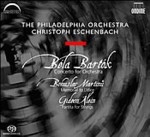This release represents one answer to the difficult question of what a top orchestra can do to make new recordings of the basic repertoire, now that the major labels are out of the picture. It offers an excellent musical programming concept, with all three works captured live in performances that are absolutely stunning and fully competitive with the best available. Both the Bartók and Martinu pieces were composed during their respective composers’ exile in America, while Gideon Klein’s Partita (an arrangement for string orchestra of his String Trio), is the result of “internal exile” in the Terezín concentration camp. All three men found ways to continue making music despite displacement, personal misfortune, and against the background of the rise of Naziism and the onset of war. More to the point, the program works because it offers plenty of purely musical contrast and variety.
Martinu’s Memorial to Lidice, a town wiped out by the Nazis as an act of retaliation for the assassination of Reinhard Heydrich, is a harrowing but ultimately hopeful orchestral elegy that receives the most gut-wrenching performance yet recorded. Eschenbach is about 50 percent slower than Ancerl (or anyone else), but he uses the extra time to excellent effect, revealing every luminous detail of Martinu’s orchestration and building the music to a shattering climax, with Beethoven’s Fifth balefully intoned by the horns. Klein’s Partita has much in common with Bartók’s Divertimento, with its folk-inflected thematic material. Its central movement is a very attractive set of variations on a Moravian theme, and it’s clear from this performance that the Philadelphia tradition of great string playing is very much alive and well. Eschenbach leads a performance both warm and incisive, revealing a major work in the process.
The Philadelphia Orchestra already has at least two recordings of Bartók’s Concerto for Orchestra to its credit, both with Eugene Ormandy–a fine early stereo version on Sony, and a mediocre early digital remake on RCA. This newcomer clearly is finer than either of those, as exciting a rendition as any available. Eschenbach thankfully eschews the excessive slowness that has marred his recent Mahler performances and lets the various sections of the orchestra display their considerable prowess in what remains one of the repertoire’s great showpieces. Listen to the rush of excitement in the transition to the first-movement allegro, or to the beautiful balance between woodwinds and harps in the second subject; notice the brilliant brass fugato that initiates the recapitulation, and the driving coda. It’s the real deal, from the very first note.
In the second movement, all of the various duos come off splendidly, with particularly sexy contributions from the clarinets. Eschenbach takes care to bring out plenty of textural details in the dark slow movement without ever letting the music bog down in the process, and the violins are wonderfully anguished and expressive. The big tune in the fourth movement, with softly stroked harps, is wonderfully sensual, which makes the raucous interruption all the more amusing. Eschenbach takes the finale at a good clip, but also gets the strings to really articulate their rushing figures whenever they appear. The fugal development is extremely clear, well-balanced, and effectively phrased to lead the ear through its contrapuntal intricacies. The entire coda, from its darkly swirling opening, never has been shaped more effectively. In sum, this performance offers masterful musicianship with the kind of spontaneity that you expect from a live performance.
This release also is interesting as a sample of the “Philadelphia Sound” in its new home, and the news is generally good there too. The sonics are markedly superior to what Sony, RCA, and EMI used to get in any of the various venues that they used, at least in stereo. The microphones are close to the players, the better to reduce the occasional noise from the audience (the occasional light cough isn’t at all bothersome), but the orchestra can take the exposure, and the sonic impact is pretty thrilling. In 5.0 multichannel surround-sound, excessive emphasis on the center channel collapses the stereo image in a way that makes the disc sound like it was recorded in mono, though this is still preferable to excessive rear-channel emphasis, which happily is not a problem. I vastly prefer the sonics in either regular or SACD stereo, which really do set a new standard for recordings made in Philadelphia, and the rating reflects only the stereo option. All in all, this release represents a most auspicious beginning to the relationship between Philadelphia and Ondine. I’m pleased (and honestly relieved) to be able to recommend it to you in the strongest possible terms. [11/10/2005]
































